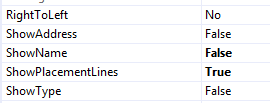How does one tell the designer the default value of a Property when it is not one of the types supported by DefaultValue()? For instance, a Padding, or a Font.
Normally, when you use a Windows Forms control, the default values w开发者_如何学运维ill be in a normal font in the Properties window, and changed (non-default) values will be in bold. E.g.

In this sample, the default value of ShowAddress is false and the default value of ShowName is true. This effect is achieved with the following:
[DefaultValue(false)]
public bool ShowAddress {
get { return mShowAddress; }
set {
mShowAddress = value;
Invalidate();
}
}
[DefaultValue(true)]
public bool ShowName { ... }
However, when I tried to do something for Padding, I failed miserably:
[DefaultValue(new Padding(2))]
public Padding LabelPadding { ... }
Which of course won't compile.
How on Earth would I do this?
Try this:
[DefaultValue( typeof( Padding ), "2, 2, 2, 2" )]
public Padding LabelPadding
{
get { return _labelPadding; }
set { _labelPadding = value; }
}
Try this:
private static Padding DefaultLabelPadding = new Padding(2);
private internalLabelPadding = DefaultLabelPadding;
public Padding LabelPadding { get { return internalLabelPadding; } set { internalLabelPadding = value; LayoutNow(); } }
// next comes the magic
bool ShouldSerializeLabelPadding() { return LabelPadding != DefaultLabelPadding; }
The property browser looks for a function named ShouldSerializeXYZ for each property XYZ. Whenever ShouldSerializeXYZ returns false, it doesn't write anything during code generation.
EDIT: documentation:
- [1]: http://msdn.microsoft.com/en-us/library/ms973818.aspx
- [2]: http://msdn.microsoft.com/en-us/library/53b8022e.aspx





![Interactive visualization of a graph in python [closed]](https://www.devze.com/res/2023/04-10/09/92d32fe8c0d22fb96bd6f6e8b7d1f457.gif)



 加载中,请稍侯......
加载中,请稍侯......
精彩评论